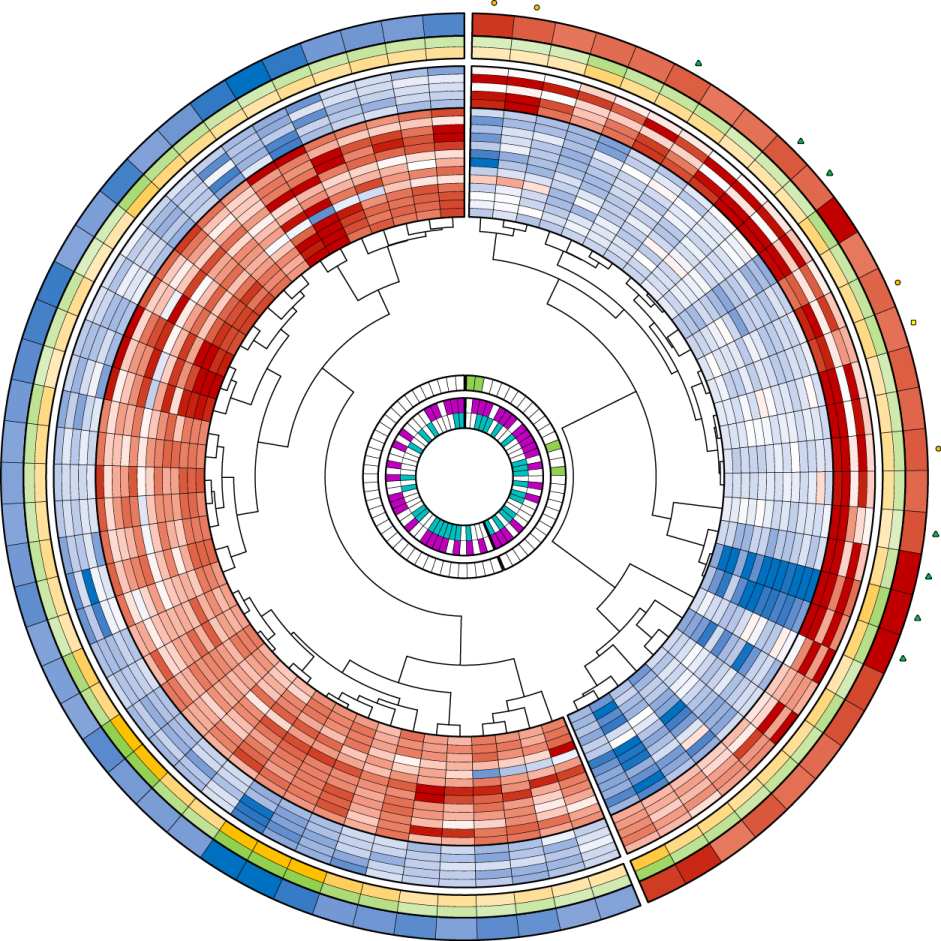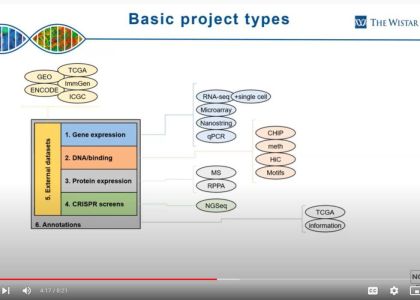CCSG Bioinformatics Facility
Overview
The Bioinformatics Shared Resource continuously develops new and efficient approaches to data analysis as a response to emerging research needs. Facility functions include: statistical analyses and computational modeling; advanced bioinformatics tools for integrative cancer biology; and data management. Routine data analyses include large scale information datasets (-omics data) generated by high-throughput technologies, which address the following areas:
- Gene expression (bulk and single-cell RNA-seq, spatial transcriptomics, smRNA-seq, Nanostring, legacy microarrays)
- Gene regulation (ChIP-seq, CUT&RUN, ATAC-seq, epigenetic profiling, methylation assays)
- Screening technologies (CRISPR, shRNA, small molecule screening)
- 3D genome organization (HiC, Hi-ChIP)
- Genome and transcriptome sequencing (alternate splicing, RNA editing, mutation detection, CNV, LOH)
- Biomarkers (discovering markers in mRNA, miRNA and protein expression data)
- Proteomic analyses (mass spectrometry-based spectra, LCMS, DIGE, RPPA, spatial proteomics, etc.)
- Pathway and network analysis
- Integration of multi-platform data
- Other customized data analysis projects

Services
- High-throughput data analysis:
- Next generation sequencing data analysis
- Single cell RNA-seq
- Spatial transcriptomics, sequencing-based (GeoMx)
- Spatial transcriptomics, microscopy single-cell (CosMx)
- Hybridization platforms (Nanostring, microarrays)
- Low-density PCR arrays (mi-RNA, pathways, custom)
- Proteomics and metabolomics data
- CRISPR, shRNA, molecular screening
- Enrichment Analysis (Ingenuity, GSEA, DAVID, Enrichr)
- Comprehensive analysis of complex projects that require multi-platform data integration
- Consultation and support of experimental design and customized bioinformatics services
- Statistical consultation and predictive model building
- Computational support for data management, high performance computing, and custom programming
- Centralized computation resources, including data management and collaboration tools, sequence databases, homology algorithms, and other sequence manipulation tools
- Web-based application/database development and management
- Training: Ingenuity, Genome Browser(s), DAVID, GSEA
- Grant and publication support: results, methods, figures
- Advanced biological models and illustrations
Equipment and Features
- High-performance computational clusters
- GPU-enabled cluster nodes
- Integrated Wistar IT infrastructure
- Dedicated servers
- Access to storage and backup
Pricing
For pricing information, visit iLab or contact the managing director.
This facility is supported in part by a Cancer Center Support Grant (CCSG) awarded by the National Cancer Institute (NCI) to the Ellen and Ronald Caplan Cancer Center.
The Wistar Institute
Bioinformatics Facility
Room 218
3601 Spruce Street
Philadelphia, PA 19104
215-495-6898
bioinformatics@wistar.org
Jozef Madzo, Ph.D.
Co-Scientific Director
Andrew Kossenkov, Ph.D.
Co-Scientific Director
Priyankara Wickramasinghe, Ph.D.
Managing Director
Banu Chandra Karisetty, Ph.D.
Associate Wistar Scientist
Ying Ye
Bioinformatics Technician
Internal Advisors
Qin Liu, M.D., Ph.D.
Professor
9:00 a.m. – 5:00 p.m.
Monday – Friday
